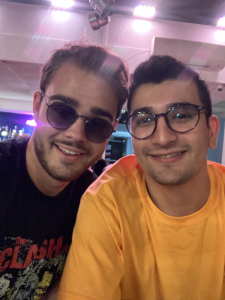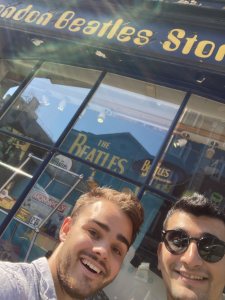An Interview With Ehsan


One of the many blessings of being in London is getting to experience its diversity. There are people from all walks of life here, each person with a unique background. One of the closest friends that I have made in London is Ehsan, who grew up in Shiraz, Iran. We have been talking since the first day we arrived and throughout our conversations and in the interview I conducted with him today, I have learned a great deal about what life was like for him in Iran and how during his experience in London, he has been undergoing a culture shock of his own.
The greatest difference between Iran and the U.K. that Ehsan pointed to was that the people of the U.K. are allowed much more freedom in all aspects of life. For one, the Iranian government strictly prohibits the practice of religions outside of Islam. Converts from Islam can be punished by execution without the right to appear before a court, despite there being an established court system in Iran. In keeping with Muslim tradition, there are many restrictions in the clothing that one can wear in Iran. Ehsan pointed out that while some of these restrictions are on men– they are not allowed to have tattoos or to show their arms or legs in a work setting– the majority of the laws are specific to women. They must cover their arms, legs, and hair at all times with a hijab, so as to not be a distraction to the men. Free speech is also limited in Iran, as its people are prohibited to criticize the government.
Besides these more obvious changes, Ehsan has noticed some differences in his social life. While in the U.K. it is normal to decline someone’s offer of food, Ehsan was taken aback that people would decline his offers, as in Iran, it is not considered polite. He also noticed that people in the U.K. are more likely to talk to strangers in Iran, which was a very interesting perspective to me because when compared to the U.S., the U.K. seemed more reserved in that sense. Ehsan said that when you do talk to people in Iran, it’s not common to express your emotions. Most people put up a front when they are in public. Still, Ehsan has incredibly close relationships with his friends back home, which is something that he misses.
When I asked Ehsan about what else he misses from Iran, he was fixated on food. His absolute favorite dish, which his mom would often make, is tahchin. It appears almost like a cake, baked with rice and eggs, filled with chicken, and topped with tart barberries. The dish that he left me craving the most was faloodeh, a dessert that looks like noodles, which are actually made of a sorbet-like frozen syrup. It is also very common, he told me, to eat koobideh, a lamb or beef kebab served with rice and grilled tomatoes.
One of Ehsan’s family traditions is to grill koobideh on seezdah be de. This day is the last of the 13 day-long holiday of Nowruz. Nowruz is celebrated from the first day of the spring equinox onward, as this is where the Persian calendar starts. It is similar to the U.S. New Years, and is the most popular holiday celebrated in Iran. On the final day of Nowruz, seezdah be de, it is custom to spend the day out in nature, to dispel any negativity out of your life. Ehsan’s family likes to hike, or to play football and volleyball during this time. Another fun tradition of this day is to tie a piece of grass and make a wish.
My interview with Ehsan has challenged me to approach every person with a grain of salt, without making assumptions that their expectations in social situations are the same as mine. I hope that my relationship with Ehsan continues to grow!
